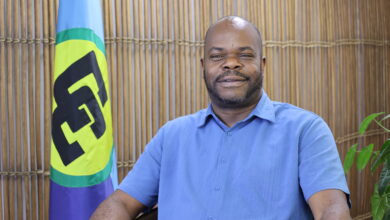Members of the CARICOM Ministerial Sub-Committee for Resource Mobilisation for Crime and Security met with a UK Senior Level Team on Security Cooperation at the Hilton Hotel, Kingston Jamaica on 3 March 2004. The aim of the meeting was to follow up the discussions at the Breakfast meeting between UK Prime Minister Tony Blair and Prime Minister PJ Patterson, Chair of CARICOM and other CARICOM Heads of Government in London, December 2003. It was agreed that a joint CARICOM/UK consultation would focus on a framework for coordinated action for crime prevention and security, the challenges of the drug trade, improving interdiction, tackling the proliferation of illegal weapons and enhancing the Region’s capacity to tackle crime.
The meeting was Chaired by Dr. The Honourable Peter Phillips, Minister of National Security and included The Hon. Mia Mottley, Deputy Prime Minister and Attorney General, Barbados, The Hon. Cynthia Pratt, Deputy Prime Minister and Minister of National Security, Bahamas, The Hon. Rodwell Ferguson, Minister of State in the Ministry of Home Affairs, Belize and Mr. Overand Padmore, National Security Advisor to the Hon. Prime Minister, Trinidad and Tobago.
The UK team was lead by Mr. Bill Rammell M.P., Parliamentary Under-Secretary of State in the Foreign and Commonwealth Office and included H.E. Mr. Peter Mathers, British High Commissioner to Jamaica and representatives of the Ministry of Defence, the Foreign and Commonwealth Office, the Department for International Development and UK Law Enforcement agencies.
Minister Phillips outlined the context within which the discussions were taking place. He stressed the accelerated approach to achieving a CARICOM Single Market and Economy (CSME), the Region’s preparations for Cricket World Cup 2007 and general security threats among which are terrorism, illicit drugs and firearms and money laundering. He noted the need for an indigenous regional security strategy, which would inform the priorities for resource mobilisation, which is the remit of the CARICOM Ministerial Sub-Committee under his Chairmanship. He pointed out that the CARICOM Regional Task Force on Crime and Security at its Ninth Meeting in February 2004 had developed several priorities in its plan of action. However, he suggested that the agenda for this joint UK/CARICOM Meeting should focus on four issues: Training of Security and Law Enforcement Officials, Regional Information and Intelligence Sharing, Border Security Enhancement and Regional Maritime Cooperation. These he concluded were all vital components of an overall regional security strategy.
Minister Rammell noted that there was already a good level of cooperation between the UK and the Caribbean on security matters but agreed that much more could be done. He wanted to listen to the concerns of the region and hoped that it would be possible to identify priorities for enhancing our cooperation. The UK contribution to this would only have a lasting impact if the Caribbean Side established the appropriate framework for success, notably through the adoption of necessary legislation.
The Meeting agreed on the follow priorities:
1. Training of security and law enforcement officials: The aim is to develop a regional framework for providing staff, command and leadership training for all security and law enforcement sectors. The CARICOM/UK team working with the relevant police training schools and UWI will seek to harmonize training programmes, as well as, increase the number of courses and expand the research capabilities within UWI and other tertiary level institutions within the region.
The UK will seek to identify substantial funding to support this. They will carry out a scoping study in March-April, 2004, with a view to an institutionalised training programme being delivered from October 2004.
2. Establishing a Regional Information and Intelligence Sharing Network: This will aim to develop domestic and regional connectivity to generate tactical and strategic intelligence. This was identified as the highest priority.
A CARICOM Team comprising experts in IT and security, chaired by Mr. Francis Forbes, Commissioner of Police, Jamaica Constabulary Force, will develop the framework for the Coordinating Information Management Authority (CIMA), which is to be appointed as a matter of urgency. This Authority/Unit will be responsible for supervising the development and implementation of the regional network. The CIMA will consult with a UK expert who will be deployed as soon as possible.
3. Maritime Cooperation: The Meeting pledged to develop a framework for upgrading the asset base in the Caribbean and, in parallel with this, to review the Regional Maritime Agreement with a view to signature. In this regard, the UK and CARICOM, in collaboration where appropriate, with other countries or partners, will carry out a survey to assist Member States in upgrading their capabilities. The UK agreed to take the lead and coordinate a steering committee to this end. These activities will be carried out in time for the UK/Caribbean Forum, 10-12 May 2004, London.
4. Border Security: CARICOM will establish an Expert Group to identify the priorities in this area and will meet with the UK Expert team to plan an implementation strategy in time for discussion at the UK/ Caribbean Forum in May, 2004. The findings of this expert group will feed into the aforementioned steering committee on maritime cooperation.
5. A Regional Security Strategy: UK/CARICOM will undertake to draft an integrated framework document on a regional security strategy with a view to this being agreed in the UK/ Caribbean Forum, May, 2004.





